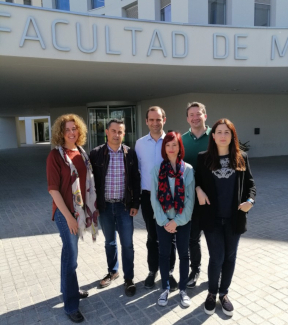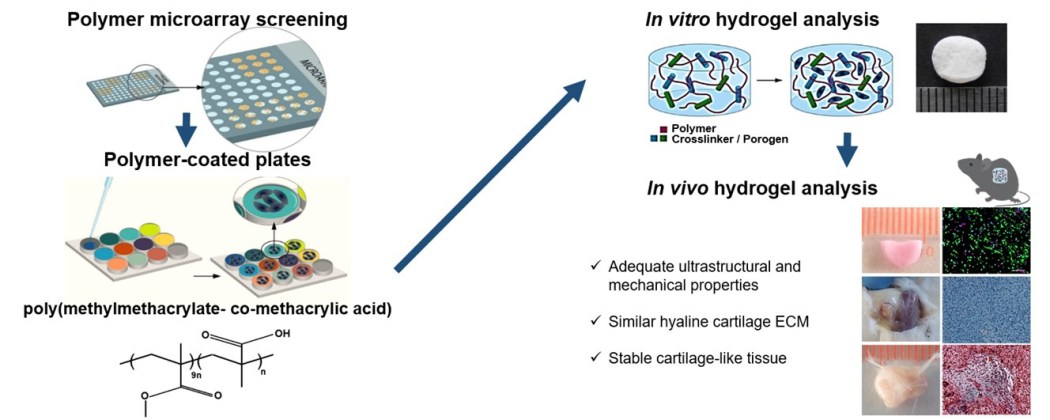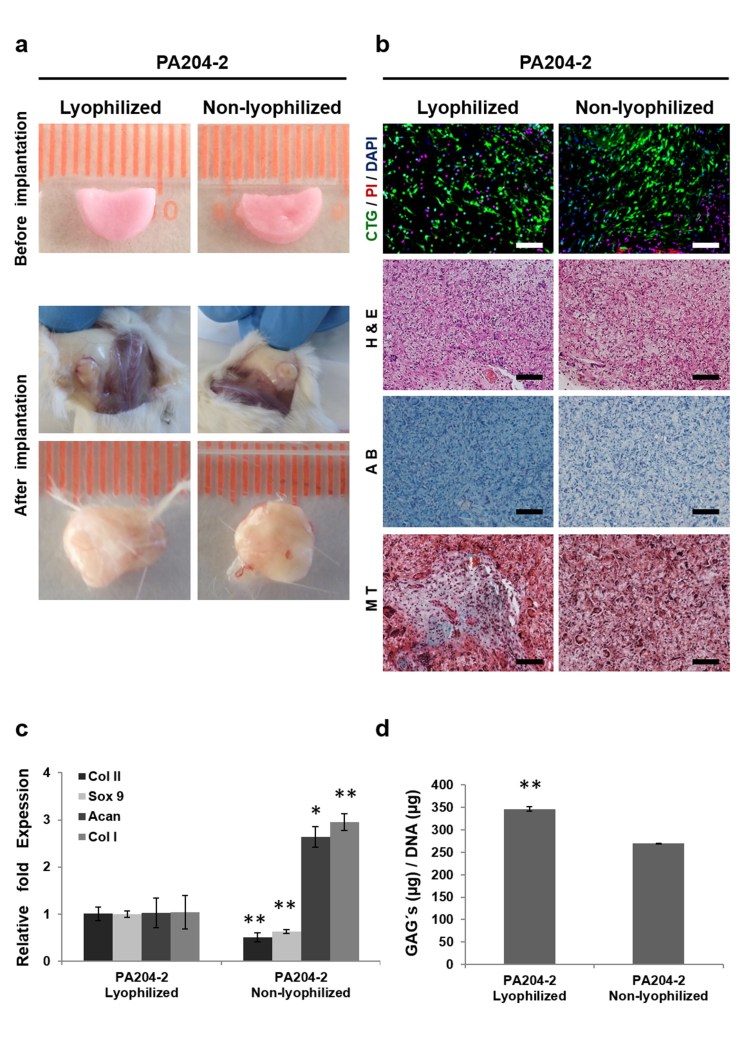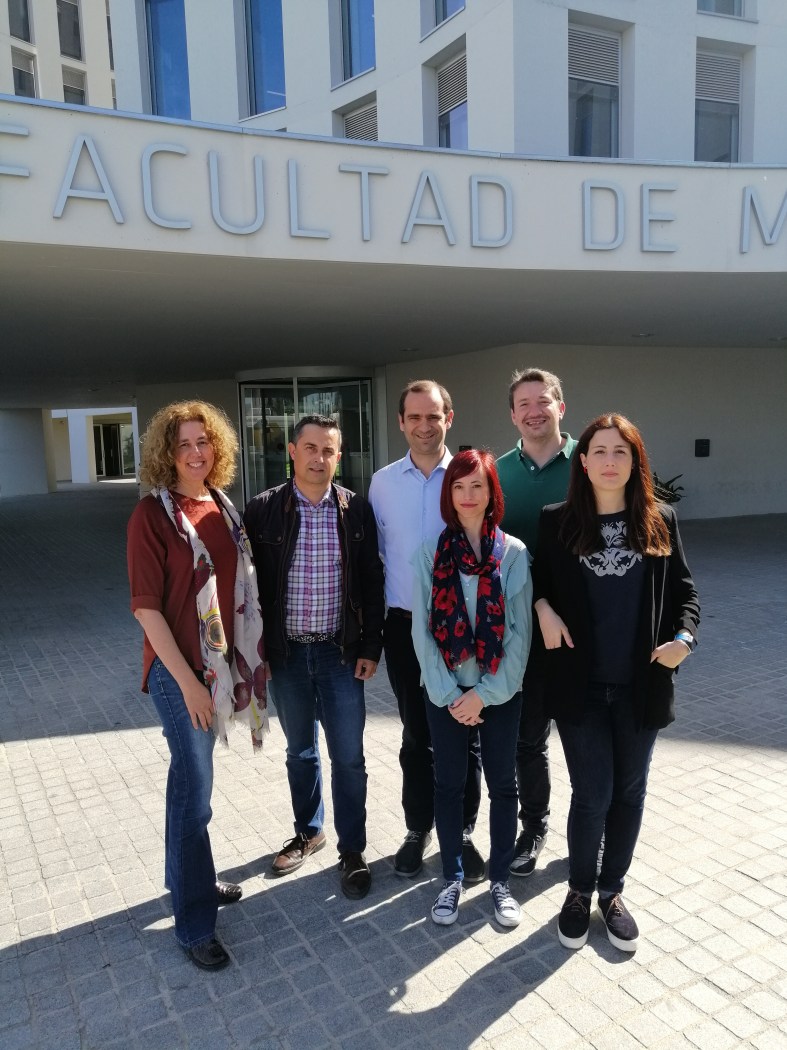
- An international team of scientists demonstrates that polyacrylate hydrogels create the support and microenvironment necessary for the growth and maintenance of cartilage cells (chondrocytes), and could be optimal candidates for use in clinical practice
- The results have been published in the prestigious journal Acta Biomaterialia
Cartilage degeneration and damage treatment remain a major challenge in today’s society; hence, tissue engineering strategies are being developed to investigate new alternatives based on a combination of cell therapy and 3D scaffolds to support cartilage cells. Such therapies have emerged as a promising new approach to the treatment of cartilage injuries.
An international team of scientists, led by the University of Granada (UGR), has designed a new hydrogel using pioneering “polymer microarrays” technology, which successfully helps to regenerate cartilage.
The researchers evaluated the adhesion capacity and viability of healthy chondrocytes extracted from patients with osteoarthritis of the knee, screening over 380 different polyacrylate and polyurethane polymers. Of these 380 alternatives, they selected the ten polymers that presented the best properties in terms of facilitating the adhesion and viability of this cell type in particular. They also performed further assays to test the ability of these 10 polymers to support chondrocyte proliferation to produce cartilage matrix in long-term cultures.
The polymer poly (methylmethacrylate-co-methacrylic acid) was found to present the best biological and chemical characteristics, and was thus selected to synthesize hydrogels for use as 3D matrices. The analysis and characterisation of the ultra-structural morphology, the microstructure, and the mechanical tests of this new hydrogel showed that it possessed the required characteristics to generate a support that mimics the environment that chondrocytes need in the cartilage.
Furthermore, biological characterisation of this material showed that it has the capacity to generate the appropriate niche for growth in a number of chondrocytes, while retaining their characteristics in the long-term culture in the laboratory setting. This was demonstrated by the high expression of genes characteristic of chondrogenesis, such as Type II collagen, SOX-9, and aggrecan. Not only that, these chondrocytes proliferated by colonising the entire hydrogel, producing an extracellular matrix rich in proteoglycans, similar to that which they produce in native cartilage.
Enormous potential
Subsequent studies on mice verified the tremendous potential of this polyacrylate. First, the implantation of the hydrogel in immunocompetent mice showed that the material is totally biocompatible, presenting no signs of rejection by the organism. Furthermore, mouse cells colonised the hydrogel and secreted extracellular matrix. Second, the implantation of the hydrogel after it had previously been in culture with patients’ chondrocytes for 21 days showed that, when taken from the mice, the chondrocytes continued maintaining their viability, proliferating, and expressing chondrogenesis genes, producing the matrix typical of the aforementioned cartilage.
“It is for this reason that the poly hydrogel (methylmethacrylate-co-methacrylic acid) presents structural characteristics and mechanical and biological properties that help generate a substitute tissue similar to healthy cartilage. We therefore propose this new material as an excellent candidate for cartilage regeneration, to overcome the limitations of current approaches based on scaffolding in the treatment of osteoarthritis,” explains the principal author of this work, Juan Antonio Marchal Corrales, Professor of Anatomy and Human Embryology at the UGR.
This study was conducted by a multidisciplinary team of scientists comprising researchers from different national and international institutions, such as the University of Edinburgh, the 3B’s Research Group (University of Minho), the University of Jaén, and the Virgen de la Victoria University Hospital, Málaga, all of whom were led by scientists from the research group Advanced Therapies: Differentiation, Regeneration and Cancer (UGR), pertaining to the Biohealth Research Institute in Granada (ibs.GRANADA) and the Scientific Unit of Excellence, Modelling Nature: From Nano to Macro (also UGR).
Bibliography
Jiménez G, Venkateswaran S, López-Ruiz E, Perán M, Pernagallo S, Díaz Monchón JJ, Canadas RF, Antich C, Oliveira JM, Callanan A, Walllace R, Reis RL, Montañez E, Carrillo E, Bradley M, & Marchal JA *. A soft 3D polyacrylate hydrogel recapitulates the cartilage niche and allows growth-factor free tissue engineering of human articular cartilage. Acta Biomaterialia. 2019 May; 90: 146–56. Doi: 10.1016/j.actbio.2019.03.040.
Image captions:




Juan Antonio Marchal Corrales
Department of Human Anatomy and Embryology
Faculty of Medicine, University of Granada
Tel.: +34 958 241000 ext. 20080 or +34 958 249321
Email: jmarchal@ugr.es
Juan José Díaz Mochón
Department of Pharmaceutical and Organic Chemistry
Faculty of Pharmacy, University of Granada
Tel.: +34 958 243843
Email: juandiaz@ugr.es